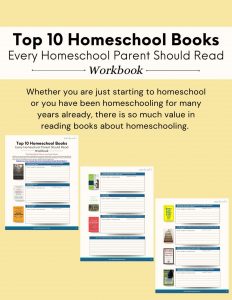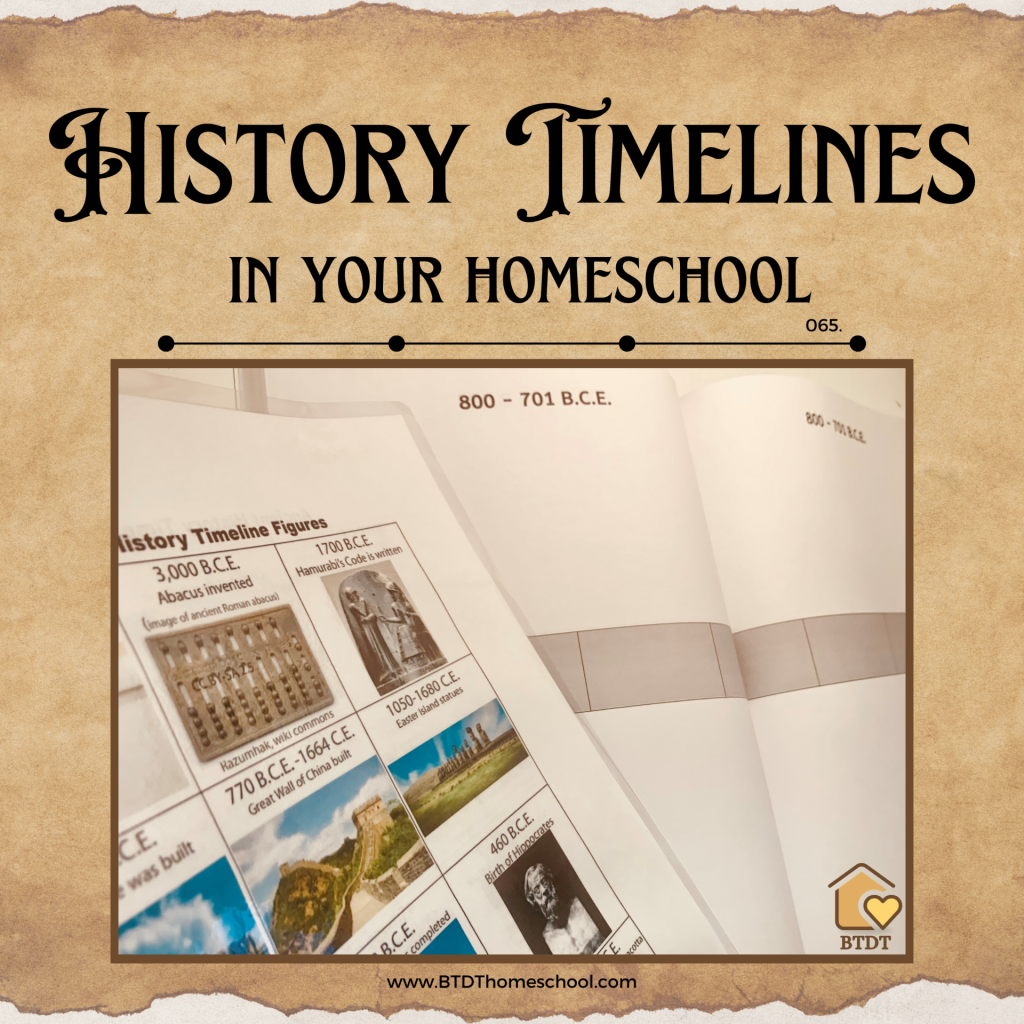
043.
Top 10 Books Every Homeschool Parent Should Read
We talk all the time about the importance of reading. Just last week, we shared our favorite Middle School Chapter books as a sequel to an earlier episode when we shared Early Elementary Favorites when you have a brand-new reader.
We’ve had a lot of homeschoolers reach out to us asking for our favorite book selections they can read to help them on their homeschool journey so we created this list of our absolute favorites just for you!
Tune in!
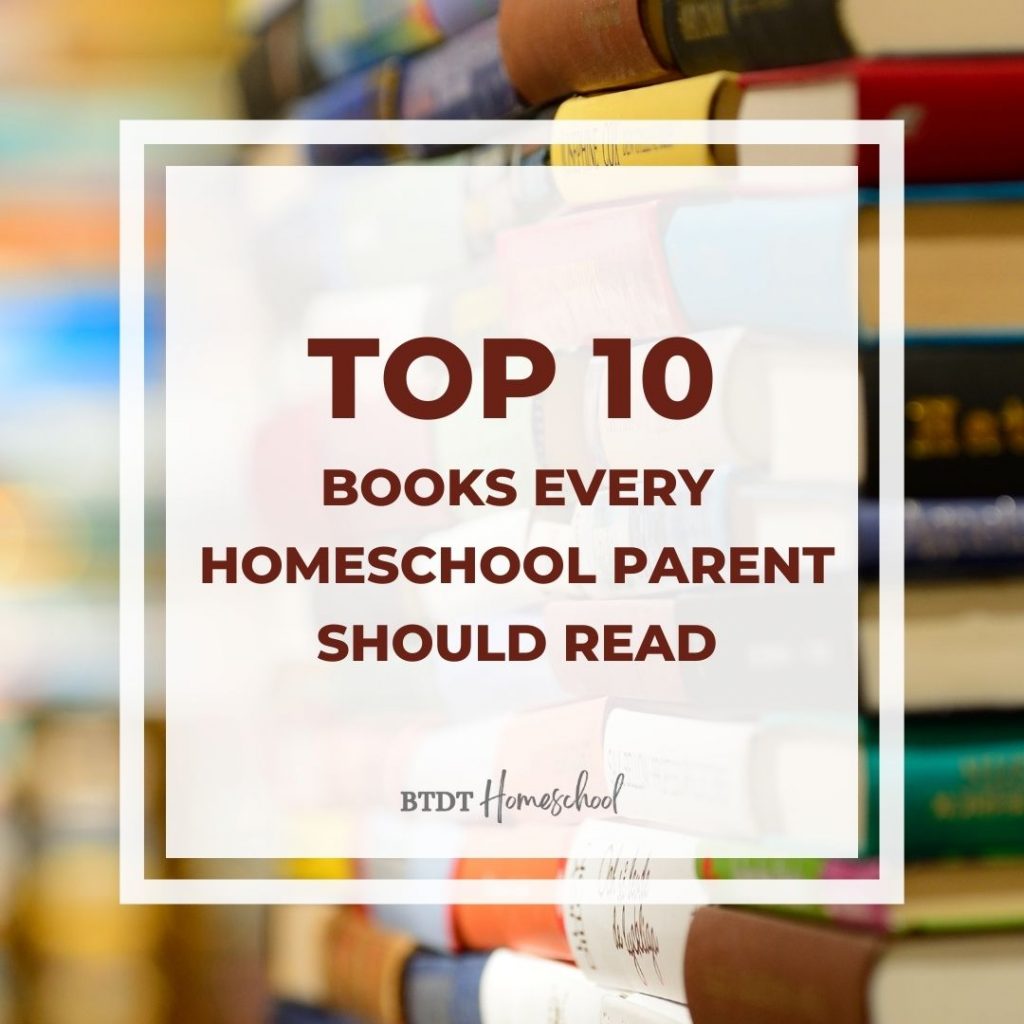
Episode 043:
TWO WAYS TO LISTEN TO THIS EPISODE:
1. Click PLAY Button Above ^^ to listen here.
2. OR Listen on your favorite podcast platform:
Scroll down for this week’s FREEBIE:
Free Companion Workbook (pdf)
Brand New to Homeschooling?
GETTING START PAGE >>
Kindergarten Page >>
High School Series >>
Show Notes
Whether you are just starting or thinking about starting to homeschool or you have been homeschooling for many years already, there is so much value in reading books about homeschooling. Even as old-hands, we have a couple favorite books that we often reread every year just to get re-inspired and motivated for the upcoming school year.
Also, every week we do a “Favorite Book Friday” social media post (Follow us: BTDT Facebook and BTDT Instagram). Oftentimes, these books have something to do with the current episode, but even if it’s a topic that we know a lot about, we like to stay current and keep a fresh list of books that we’ve read ourselves so that we can share them with you. We always feel a little weird about sharing a book we haven’t read so we really do try and read all of them, or at the very least, post books that lots of friends have recommended. The list we are going to present today is a combo of our personal favorites and books that seem to frequent everyone else’s favorite lists.
There’s so many reasons to read and continue reading homeschooling books. For one, it can really help you to understand all the different homeschooling methods out there. Homeschooling approaches vary widely, from traditional to unschooling, Montessori, Charlotte Mason, and more. Books can provide insight into different methods, helping parents identify the one that aligns with their values, teaching style, and their child’s learning needs. Our homeschool style has changed a lot from when we first started. Just like parenting, we have evolved and grown and we always try to keep an open mind to new ideas and methods as our children’s learning needs have changed.
We talk in our Getting Started page and in our 7 Steps to Choosing Curriculum episodes how knowing your homeschool method/style is really going to help you narrow down curriculum choices and there are a great many books that offer recommendations for curriculum, teaching materials, and resources.
Homeschooling involves careful planning and organization to ensure a well-rounded education. There are a lot of books that can guide parents on creating schedules, setting goals, and tracking progress. And we especially like the ones that talk about maintaining home and day to day activities, too, because this really is an entire lifestyle.
So many families have turned to homeschooling because their children have special needs or different abilities that were not being met in traditional school and benefit from homeschooling one on one. Books can offer guidance on overcoming these challenges specifically in your homeschool.
Some parents worry about socialization and extracurricular activities when trying to make that decision about homeschooling. A lot of homeschool books talk about the pros and cons of homeschooling/traditional schooling and can really ease your mind and offer ideas and insights into these different concerns. Reading books on homeschooling can really boost your confidence by providing a deeper understanding of the educational process and dispelling some of those myths and misconceptions. Some of these books are also going to provide insights into the long-term outcomes of homeschooling, including college admissions, career paths, and the development of well-rounded kiddos.
Homeschooling is a huge decision that affects a family’s lifestyle and dynamics. Reading books can help parents make informed decisions by considering various factors and potential outcomes. This is one of the things we really encourage parents to do while deschooling – which is a vital step to a successful homeschool after withdrawing your child from a school environment. Read, read, read! Learn more in Deschooling 101.
Remember that while books are a valuable resource, they should be used alongside other sources of information, such as online forums, local homeschooling groups, and educational websites, and podcasts like this one! Each family’s homeschooling journey is unique, so finding the right resources and support is essential to create a successful experience for you and your kids.
Top 10 Favorite Books (10:31)
1. John Taylor Gatto “Dumbing Us Down”
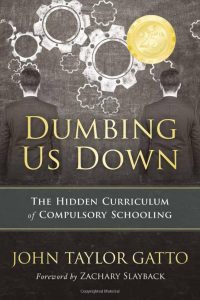
“Dumbing Us Down: The Hidden Curriculum of Compulsory Schooling” by John Taylor Gatto is such a thought-provoking critique of the modern education system. Drawing from his experience as a long-time teacher in public schools, he argues that compulsory schooling suppresses individuality, creativity, and critical thinking.
He delves into the hidden agenda of education, revealing how it has become more about social control and conformity rather than fostering true learning and personal growth. Gatto challenges the traditional model of education, suggesting that it stifles students’ curiosity and innate desire to explore the world. Throughout the book, he advocates for a more personalized and student-driven approach to education, emphasizing the importance of self-directed learning and real-life experiences.
While some may find his ideas radical, “Dumbing Us Down” is really an eye-opening read that can spark important conversations about the purpose and effectiveness of our modern education system. It will make you question the status quo and consider alternative approaches that empower students to become active, engaged, and critical thinkers. It’s an older book- published in 1992.
2. John Holt “How Children Learn”
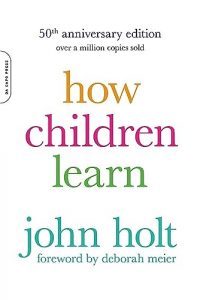
3. John Holt “Teach Your Own”
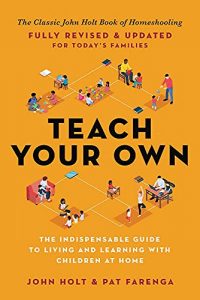
John Holt’s books, “How Children Learn” and “Teach Your Own,” are timeless classics that have profoundly influenced the homeschooling movement. (And when we say timeless, these were originally written in 1967 and 1981). Holt talks about the natural ways that children absorb knowledge through curiosity, play, and self-discovery. He draws from his observations as an educator and advocates for a child-centered approach that respects the individual pace and interests of each learner.
In “Teach Your Own,” Holt collaborates with co-author Patrick Farenga to provide practical guidance for parents considering homeschooling as an alternative to traditional schooling. They emphasize the importance of fostering a nurturing and supportive learning environment at home and encourage parents to trust their instincts in facilitating their child’s education. Together, these books present a powerful argument for respecting children as active participants in their own learning journeys and highlight the benefits of a more flexible, self-directed, and personalized education. Holt’s insights and wisdom continue to inspire parents and educators alike, offering valuable perspectives on how children truly learn and the potential rewards of embracing a more natural, child-led approach to education.
4. Raymond and Dorothy Moore “Better Late Than Early”
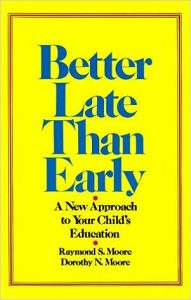
“Better Late Than Early: A New Approach to Your Child’s Education” by Raymond and Dorothy Moore was actually required reading for parents joining our homeschool co-op in North Carolina with younger than school age kids. This book really challenges conventional wisdom by advocating for a later start to formal education. They argue that children’s natural development and readiness should dictate the timing of formal schooling, favoring a more relaxed and child-centered approach. They present compelling research supporting their stance, highlighting potential negative consequences of early formal education on children’s physical, emotional, and intellectual well-being. By emphasizing the significance of hands-on learning, exploration, and play during early childhood, the authors provide a refreshing perspective on education.
While the book may not appeal to everyone, especially those who prioritize academic rigor from a young age, “Better Late Than Early” offers so many insights into the potential benefits of allowing children to mature naturally before introducing structured schooling. It encourages parents to be attuned to their child’s individual needs and readiness, promoting a more holistic and balanced educational experience.
5. Julie Bogart “Brave Learner”
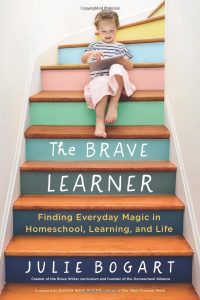
“Brave Learner: Finding Everyday Magic in Homeschool, Learning, and Life” by Julie Bogart is an empowering and heartfelt guide for homeschooling parents seeking to create an enriching and joyful learning experience for their children. With a warm and encouraging tone, Bogart shares her insights as a seasoned homeschooling mother and founder of the Brave Writer. The book explores the concept of “Brave Learning,” where the emphasis is placed on cultivating a love for learning, fostering creativity, and nurturing curiosity. She encourages parents to embrace a more relaxed and flexible approach, tailoring education to each child’s unique strengths and interests. Throughout the book, she offers practical tips and engaging activities that parents can easily incorporate into their homeschooling routine.
Furthermore, “Brave Learner” delves into the importance of family connection and making learning an integral part of everyday life. This book is not just about homeschooling; it’s about cultivating a family culture that values growth, exploration, and the celebration of each individual’s learning journey. “Brave Learner” is a compelling read that will inspire and support homeschooling families in creating a thriving and authentic educational experience for their children.
6. Rebecca Rupp “Home Learning Year by Year”
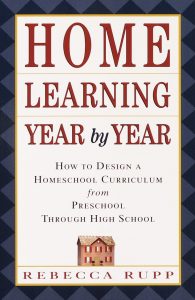
“Home Learning Year by Year: How to Design a Homeschool Curriculum from Preschool Through High School” by Rebecca Rupp is an indispensable guide for homeschooling parents seeking to craft a comprehensive and flexible curriculum tailored to their child’s individual needs. Rupp’s book offers a well-organized and practical approach, covering various age groups from preschool through high school. The book provides valuable insights into age-appropriate learning activities, subject recommendations, and educational milestones for each grade level.
She emphasizes the importance of nurturing a child’s curiosity and interests while ensuring a solid foundation in core subjects. The suggested resources, reading lists, and project ideas make it easy for parents to plan engaging and well-rounded lessons. Whether new to homeschooling or experienced, “Home Learning Year by Year” serves as an invaluable resource, empowering parents to confidently navigate their child’s education journey and foster a love for learning that extends beyond the traditional classroom setting.
7. Emily Cook “A Literary Education”
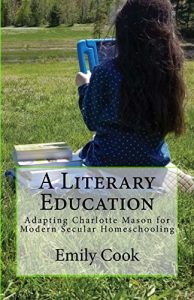
We can’t really talk about Emily’s book without starting out by talking about Charlotte Mason’s original book series. Her educational series is a wealth of timeless wisdom and insights into a holistic and child-centered approach to education. It consists of six volumes and this series lays out Mason’s educational philosophy and methodology in a comprehensive and accessible manner. Mason’s ideas revolve around respecting the child’s personhood, fostering a love for learning, and presenting a wide range of living ideas and living books to capture the child’s imagination. She emphasizes the importance of short lessons, outdoor exploration, and cultivating good habits. Through her writings, Mason advocates for a rich and diverse curriculum that includes literature, the arts, nature study, and practical life skills. Her approach places a high value on narration as a means of encouraging children to absorb and assimilate knowledge actively. The series beautifully intertwines philosophy and practical advice, making it a valuable resource not only for homeschooling parents but also for educators seeking to create a nourishing and meaningful learning experience for their students . These are really old- 1886! But Charlotte Mason’s educational series has stood the test of time and continues to inspire and shape progressive educational practices that honor the unique potential of every child’s mind and spirit.
Now some people really struggle with the old books and there are a lot of adaptations of her ideas. As a homeschooling parent or educator seeking to cultivate a love for literature and a deeper understanding of classic works, “A Literary Education: Adapting Charlotte Mason for Modern Secular Homeschooling” by Emily Cook is a valuable and insightful resource. Drawing inspiration from the educational philosophy of Charlotte Mason, Cook presents a secular adaptation that resonates with a wide range of homeschooling families. The book offers practical guidance on how to incorporate living books, narration, and other Charlotte Mason-inspired methods into a modern homeschool curriculum. Cook skillfully navigates the complexities of literary analysis and presents practical strategies for fostering critical thinking and meaningful discussions around classic literature.
The emphasis on cultivating a living relationship with books and allowing children to form their own connections to the stories they read is a refreshing and engaging approach. “A Literary Education” serves as an excellent companion for both novice and experienced homeschoolers and it offers a wealth of ideas and tools to create a rich, literary-focused learning environment.
8. Susan Wise Bauer and Jessie Wise “The Well-Trained Mind”
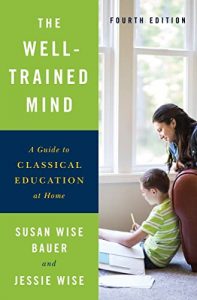
“The Well-Trained Mind: A Guide to Classical Education at Home” is an essential resource for homeschooling parents seeking to implement a classical education approach. Written by Susan Wise Bauer and Jessie Wise, the book offers a well-structured and comprehensive guide, providing clear steps and practical advice on designing a rigorous and balanced curriculum at home. The authors emphasize the importance of a classical education’s three stages – the grammar, logic, and rhetoric stages and they explain how to tailor the learning process to suit the child’s developmental needs. “The Well-Trained Mind” not only introduces parents to the classical model but also offers a wide range of subject recommendations, teaching techniques, and educational resources.
While the classical approach may not resonate with every homeschooling family, the book remains a valuable reference for those interested in a time-tested and intellectually stimulating educational philosophy. Its detailed guidance and thoughtful insights make it a valuable addition to any homeschooling parent’s library.
9. Peter Gray “Free to Learn”
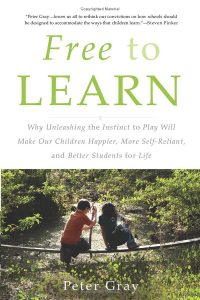
“Free to Learn: Why Unleashing the Instinct to Play Will Make Our Children Happier, More Self-Reliant, and Better Students for Life” by Peter Gray is a compelling and thought-provoking exploration of the innate drive for play and its profound impact on children’s learning and development. Gray, a prominent psychologist, challenges the traditional education system and argues that children learn best when given the freedom to explore, play, and pursue their interests autonomously. Drawing from extensive research and real-life examples, Gray makes a convincing case for the importance of unstructured, self-directed play in cultivating creativity, problem-solving skills, and emotional intelligence.
He examines the detrimental effects of overly structured schooling, emphasizing the role of play in fostering resilient, self-reliant, and motivated kids. “Free to Learn” offers a fresh perspective on education and it urges parents and educators to embrace a more natural and child-centered approach that allows children to thrive and flourish as curious and engaged learners.
10. Amber O’Neal Johnston “A Place to Belong”
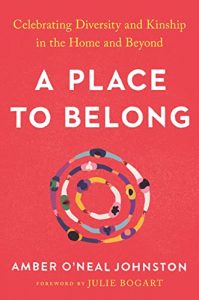
Amber O’Neal Johnston, a homeschooling mother of four, shows parents of all backgrounds how to create a home environment where children feel secure in their own personhood and culture, enabling them to better understand and appreciate people who are racially and culturally different. A Place to Belong gives parents the tools to empower children to embrace their unique identities while feeling beautifully tethered to their global community. This book is a guide for families of all backgrounds to celebrate cultural heritage and embrace inclusivity in the home and in our communities. Socially conscious parents today are looking for a way to authentically embrace the fullness of their diverse communities.
A Place to Belong offers a path forward for families to honor their cultural heritage and champion diversity in the context of daily family life by:
• Fostering open dialogue around discrimination, race, gender, disability, and class
• Teaching “hard history” in an age-appropriate way
• Curating a diverse selection of books and media choices in which children see themselves and people who are different
• Celebrating cultural heritage through art, music, and poetry
• Modeling activism and engaging in community service projects as a family
Additional favorites:
Obviously, it is hard to narrow down books to just one list of 10 because there are so many more great books out there. As always, we would love to hear from you if you have additions to this list or comments and feedback about any of these books.
“Simplicity Parenting: Using the Extraordinary Power of Less to Raise Calmer, Happier, and More Secure Kids” by Kim John Payne and Lisa M. Ross
“The Call of the Wild and Free: Reclaiming Wonder in Your Child’s Education” by Ainsley Arment
“A Charlotte Mason Companion: Personal Reflections on the Gentle Art of Learning” by Karen Andreola (this is actually a favorite of mine- it is not secular, but it is easy to just skip over the bible chapter).
“The Montessori Method” by Maria Montessori
“The Unschooling Handbook: How to Use the Whole World as Your Child’s Classroom” by Mary Griffith
“The Well-Adjusted Child: The Social Benefits of Homeschooling” by Rachel Gathercole
“For the Children’s Sake: Foundations of Education for Home and School” by Susan Schaeffer Macaulay
“The Teenage Liberation Handbook: How to Quit School and Get a Real Life and Education” by Grace Llewellyn
“Project-Based Homeschooling: Mentoring Self-Directed Learners” by Lori McWilliam Pickert
This Week’s Freebie:
